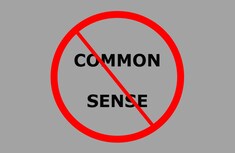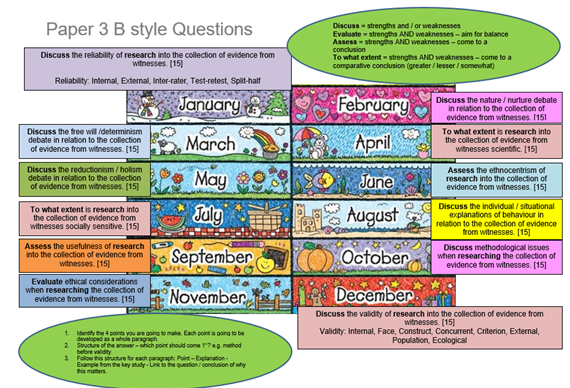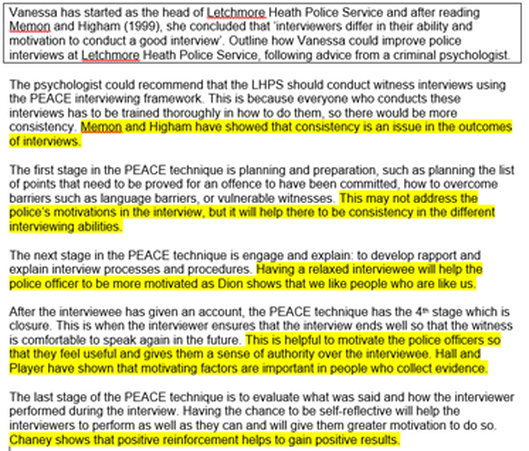|
After Section A: Issues of Mental Health, which is compulsory for everyone, you have Section B options.
|
Feel like you are saying the same thing more than once?
The 3 Styles of Questions for Section B Options
A style questions are worth 10 marks. They often written in the same way: Using the key research by ... explain / discuss … [10]
For example:
The examiner is wanting to see
Application to the topic means that you will need to explain / discuss something in relation to the topic area. This could be:
For example:
- 2019 Child option: Explain how the key research by Ainsworth and Bell (1970) could be used to help parents of young children. [10]
- 2019 Crime option: Use the key research by Haney et al. (1973) to explain how prison can affect prisoners. [10]
The examiner is wanting to see
- 5 marks for AO1: knowledge of the key study
- 5 marks for AO2: application to the topic
Application to the topic means that you will need to explain / discuss something in relation to the topic area. This could be:
- the name of the topic area such as 'the collection and processing of forensic evidence'
- the background to the key research such as 'motivating factors and bias in the collection and processing of forensic evidence'
- the strategy / application of the topic area such as 'one strategy for reducing bias in the collection and processing of forensic evidence'
You can have 2 separate paragraphs (1 to show your summary of the key research and 1 to answer the rest of the question) or combine the 2 AOs together if you choose.
Showing your AO1 knowledge (5 marks)
Showing your AO2 application skill (5 marks)
Showing your AO1 knowledge (5 marks)
- Write a study summary including the aim, sample, procedure, results, conclusions
- Remember that some key research does not have a sample, procedure, etc. such as Memon & Higham and Wilson & Kelling for Crime
- Be specific, accurate and detailed
- Use key terms wherever possible
Showing your AO2 application skill (5 marks)
- Know the title, background and strategy for each of the 6 parts of Child and Crime
- Answer about the topic as a whole, not just the key research
- Think about how research is done throughout the whole topic, not just the key research
- Refer to the key words of the question in your explanation / discussion
- Use Psychology key terms, such as pathological prisoner syndrome and the pathology of power for the Effects of Imprisonment

Key Study Summaries can be found at this link
B style questions are worth 15 marks. They often written in the same way: debate + research into the topic title. For example:
The examiner is wanting to see
The mark scheme shows that there are 8 things that the examiner wants to see:
- 2019 Child option: Discuss sampling bias in research into the development of attachment [15]
- 2019 Crime option: Discuss whether research relating to the effects of imprisonment is ethnocentric. [15]
The examiner is wanting to see
- 3 marks for AO1: knowledge
- 12 marks for AO3: analysis and evaluation
The mark scheme shows that there are 8 things that the examiner wants to see:
- Good relevant knowledge and understanding
- Many points of analysis, interpretation and evaluation covering a range of issues
- The argument is competently organised, balanced and well developed
- The answer is explicitly related to the context of the question.
- Effective use of examples
- Valid conclusions that effectively summarise issues
- There is a well-developed line of reasoning which is clear and logically structured
- The information presented is relevant and substantiated.
Know what the Question Command Words are wanting you to do
Plan your answer
Structure each paragraph
- Discuss = strengths and / or weaknesses
- Evaluate = strengths AND weaknesses – aim for balance
- Assess = strengths AND weaknesses – come to a conclusion
- To what extent = strengths AND weaknesses – come to a comparative conclusion (greater / lesser / somewhat)
Plan your answer
- At the top of your answer write down the 3 points you are going to make. For example, if the question asks for 'reliability', think of the 3 types of reliability you will be writing about
- Think about the sequence of your 3 points. For example, if the question asks for 'methodological issues', think about which point should come first, second and third, such as sample, reliability, validity.
- You can show a brief summary of the debate at the beginning of your answer. This will give a very good impression of you, even though it may not gain you any marks.
Structure each paragraph
- Point
- Explanation
- Example to illustrate this point - remember that you should refer to more research than just the key research
- Conclusion of the point (not the example) - say why the point matters
- Challenge the conclusion to show sustained analysis.
|
Child and Crime Methodological Issues summary can be found at this link
|

C style questions want you to be able to use your knowledge of Psychology to change / improve someone's life. The question has 10 marks and all of these marks are for AO2: Application.
The examiner will give you a scenario and ask you to implement a strategy to improve the situation for the person mentioned. For example:
The examiner will be looking for you to:
The examiner will give you a scenario and ask you to implement a strategy to improve the situation for the person mentioned. For example:
- 2019 Child option: Alice is the manager of a nursery school for children aged from 3 months up to 5 years. She wants to ensure that children joining the nursery are comfortable with the staff who are caring for them. What advice might a psychologist give Alice about how to ensure that her nursery is an attachment friendly environment? [10]
- 2019 Crime option: Lola is the governor of a prison. She is concerned that too many of the inmates released from her prison go on to reoffend. What advice might a psychologist give Lola about how to reduce reoffending by inmates released from her prison? [10]
The examiner will be looking for you to:
- answer the question - make it relevant for the person named in the story
- give the advice based on Psychology - if it sounds like your advice is common sense, you will not get any credit
- give the advice with detail, like a prescription for medicine, for example, who should do the actions, when, where, how often, etc.
|











